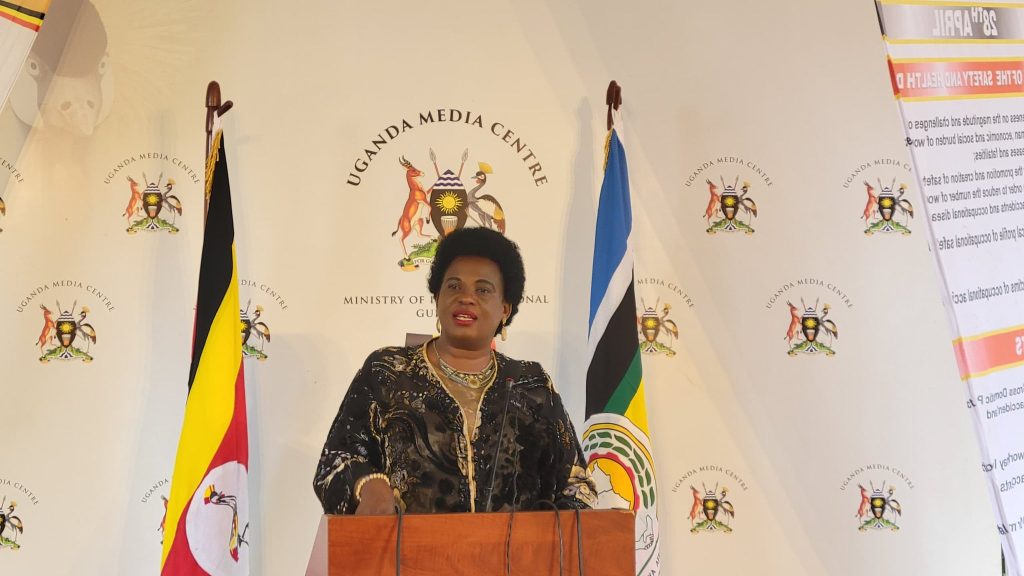
KAMPALA, Uganda — Minister of Labour, Gender and Economic Development Betty Amongi on Friday called for the nation to embrace digitalization responsibly while prioritizing the safety, health, and well-being of workers.
Amongi made the appeal during a news conference at the Uganda Media Centre as she briefed the public on the upcoming World Day for Safety and Health at Work, which will be observed on Monday, April 28, at the Uganda Industrial Research Institute (UIRI) in Namanve.
This year’s commemoration will be held under the theme: “Revolutionizing Health and Safety: The Role of AI and Digitalization at Work.”
Addressing journalists, Amongi emphasized the importance of creating safe and healthy workplaces amid evolving work dynamics and emerging technologies.
“This annual commemoration serves as a vital reminder of our collective responsibility to ensure that every worker is safe, healthy, and their well-being protected at the workplace,” Amongi said. “Employers must establish safe work procedures, maintain a clean and organized environment, and provide adequate training on occupational safety and health (OSH).”
Amongi underscored the need for employers to prioritize risk assessments and actively involve employees in identifying and mitigating workplace hazards. She added that proper procedures for handling hazardous materials, access to protective gear, and emergency response plans are critical in preventing accidents and saving lives.
“We are seeing an alarming rise in workplace incidents from factory injuries to building collapses. Many of these are preventable if employers adhere to basic OSH standards,” she noted.
Focusing on the role of Artificial Intelligence (AI) and digitalization, Amongi highlighted how technological tools can enhance workplace safety. “AI-driven systems can analyze real-time data to predict hazards before they escalate into tragedies,” she said.
However, she cautioned against over-reliance on technology without robust cybersecurity frameworks, warning that it may expose sensitive employee data and compromise safety protocols.
Amongi also pointed to the mental health challenges linked to modern digital work environments. “We must address ‘techno-stress,’ information overload, and the blurring of work-life boundaries caused by constant digital connectivity. Employers should promote mental well-being and consider ‘digital detox’ periods,” she advised.
To strengthen workplace safety enforcement, Amongi announced that the amended Occupational Safety and Health (OSH) Act has been signed into law by President Yoweri Museveni. “These new provisions will empower our teams to assess all workplace categories and take action against non-compliant employers,” she said.
The Ministry has also launched the Occupational Safety and Health Management Information System (OSHMIS), a digital platform for tracking hazards, licensing workplaces, and monitoring compliance.
Despite these efforts, Amongi acknowledged ongoing challenges such as employer reluctance to compensate injured workers, lack of health insurance, and poor enforcement of safety standards. “We have approved guidelines for inspections and whistleblowing. We are intensifying inspections, especially at the local government level, to ensure swift action against safety violations,” she said.
Assistant Commissioner for Occupational Safety and Health Eva Katushabe emphasized the significance of launching OSHMIS, a new online platform designed to streamline the reporting of workplace hazards, track safety incidents, and facilitate the registration and licensing of workplaces. “With OSHMIS, we will intensify inspections and monitoring to strengthen enforcement and ensure greater accountability in workplaces,” she stated.
Eng. Chris Opuch from the Ministry of Labour, Gender and Economic Development underscored the relevance of this year’s theme, noting the transformative impact of AI and digital technologies on the modern workplace and calling for a balance between innovation and sustainable, safe, and health-conscious practices.
Amongi urged all stakeholders to collaborate in building a safe, healthy, and digitally adaptive work environment. “Let us harness the power of digitalization responsibly. Innovation should go hand-in-hand with the well-being of our workers,” she concluded.